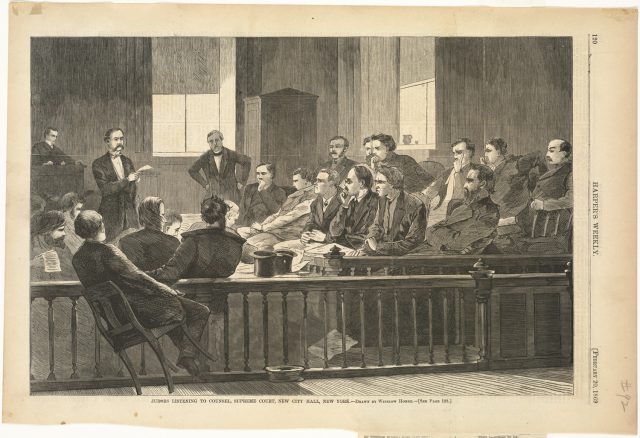
After being prodded by a judge to swear off the practice, lawyers from Google and Oracle agreed yesterday not to do any Internet research on jurors in their upcoming high-stakes copyright trial.
In a March 24 order (PDF), US District Judge William Alsup urged the two sides to make such an agreement. At that time, he indicated that Google was willing to forego researching jurors on social media, but Oracle's lawyers balked.
Looking at jurors' online information isn't unusual in high-stakes corporate trials these days, but Alsup nonetheless offered a pointed critique of the lawyers' intentions.
"Trial judges have such respect for juries—reverential respect would not be too strong to say—that it must pain them to contemplate that, in addition to the sacrifice jurors make for our country, they must suffer trial lawyers and jury consultants scouring over their Facebook and other profiles to dissect their politics, religion, relationships, preferences, friends, photographs, and other personal information," he wrote.
Both sides asked for a delay between getting the two-page juror questionnaires and choosing a jury. Alsup continued:
Wondering about the delay allocated to reviewing two pages, the judge eventually realized that counsel wanted the names and residences from the questionnaire so that, during the delay, their teams could scrub Facebook, Twitter, LinkedIn, and other Internet sites to extract personal data on the venire. Upon inquiry, counsel admitted this. The questionnaire idea cratered, and the discussion moved to whether Internet investigation by counsel about the venire should allowed at all.
Alsup saw three distinct problems with researching jurors online. First, if jurors learn of the searches, it decreases the likelihood that they will follow the court's instructions to not do their own research. Second, lawyers could model their arguments to a juror's particular preferences.
"If a search found that a juror’s favorite book is To Kill A Mockingbird, it wouldn’t be hard for counsel to construct a copyright jury argument (or a line of expert questions) based on an analogy to that work and to play upon the recent death of Harper Lee, all in an effort to ingratiate himself or herself into the heartstrings of that juror," Alsup wrote.
Avoiding an awkward discussion
The final reason is to protect the privacy of jurors and potential jurors.
"They are not celebrities or public figures," Alsup stated. "The jury is not a fantasy team composed by consultants, but good citizens commuting from all over our district, willing to serve our country, and willing to bear the burden of deciding a commercial dispute the parties themselves cannot resolve. Their privacy matters."
Alsup said he'd be within his rights to ban the trial teams from doing online research, but he was reluctant to bar lawyers from gathering information that would be "readily available to the press and every member of the public in the gallery." If the two sides wouldn't agree to a ban, however, Alsup said that both sides would have to explain their actions to the jury.
Without an agreement, Alsup insisted that "each side shall inform the venire of the specific extent to which it (including jury consultants, clients, and other agents) will use Internet searches to investigate and to monitor jurors, including specifically searches on Facebook, LinkedIn, Twitter, and so on."
Faced with the prospect of making that fairly creepy disclosure to a jury, Oracle lawyers apparently withdrew their insistence on their right to do jury research.
The social media issue came up as the two tech giants iron out details in advance of their trial set to begin next month. Oracle accuses Google of infringing copyright by using certain pieces of Java APIs. Oracle has asked to make a staggering $9.3 billion damage demand, but there's no guarantee the judge will allow that demand to go before the jury.
The case was tried to a jury in 2012, but the jury split on whether Google's use was a "fair use" or not. The jury's indecision became a moot point after Alsup ruled that no API should be subject to copyright at all. However, Alsup was overruled on appeal, so the fair use issue will now go to a new jury.
reader comments
41